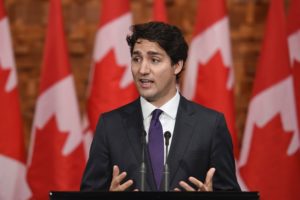The Dark of Canada: An Environmental Misfire
As opposed to popular view as the frontrunner in championing environmental enhancement and progressiveness, the country has been tangled with paltry issues that continue to plague it without coming into the light.
C

anada-based TransCanada and USA have had dialogues over a 1900 km long oil pipeline from Alberta, Canada to Nebraska, USA. Canada exports 550,000 oil barrels per day to the US. Canada could use the privately financed project to send almost 830,000 barrels directly to America. Mirroring an existing Keystone pipe, it was observably named Keystone XL.
This deal is a theoretical win-win prospect. The Alberta oil fields are landlocked and global export therefore is costly for Canada. US oil refineries are Gulf-based and they need oil cheaper. It is therefore a desperate effort for both the nations to lose dependency on Gulf-based oil. But the project would have no long-term effects. Former US President Obama declared XL incapable to reduce oil prices or affect energy power balances in the long-run. The project however has detrimental environmental ramifications. Its creation will invite oil spillage, destroying the fragile ecosystem in the sand-hills region. It also means a commitment to developing Alberta’s oil-sands in the age of renewable sources of energy. This directly contradicts Trudeau’s call for action against Climate Change. Developing oil-sands inarguably raises fossil fuel availability, enhancing further global warming. Cultivating Alberta oil-sands requires more than conventional drilling. Environment Canada has found industry chemicals seeping into ground water and the Athabasca River. There is also an added risk to local communities.
There is an ongoing debate about the US State Department and the Environment Protection Agency (EPA). Oil companies press on the insignificant impacts on greenhouse gas emissions owing to extraction from tar sands. They claim that the tar sand production, transportation and inevitable spillage are oblivious to the presence of XL. The EPA contests it stating the emissions through tar sands dangerously outweigh conventional methods, and therefore quickens the emission effects. This theory has found backing by a multitude of Canadian and North American environmentalists. On Obama’s rejection to pass the project, Trudeau expressed disappointment and called for reconsideration in future. Trudeau claims the pipeline extension would help Canada balance energy needs with environmental commitments. There lies the hypocrisy in a call for environmental action.
“Canada is the third largest holder of crude oil. Selling at a cheaper rate than US oil, the country has evolved into a petroleum-oriented economy. Hence oil-sands are extremely impactful to Canadian economic growth. The current Prime Minister opposed the construction of Keystone XL during his 2015 elections. But he has since then changed his stance in favor of the oil pipeline, just like his predecessor Stephen Harper. Trudeau aims to compete with the Gulf suppliers in oil export, even at the cost of agriculture and industry. Canadian exports are profoundly growing, so much so that it might come to India. Plans are rife to export oil and gas from the east coast of Canada to the Gujarat coast in India.” Dr. Abdul Nafey, Professor at the Centre for Canadian, US and Latin American Studies, Jawaharlal Nehru University
Additionally, Alberta extraction process in its wake has laid mammoth waste pools. Oil-sands are turned into 11 mile wide raunchy dams encircling toxic sludge lakes. It is not only an environmental challenge, but also an economic one. Cleaning up these tail-ponds is imperative, but its cost can be as much as $22 billion. Added to the misery, oil-sands companies like Suncor Energy Inc. and Syncrude Canada Ltd. fail to take charge. In 2008, lack of cost-effective clean-up measures resulted in 1600 duck and more than 100 other bird fatalities in Syncrude and Suncore ponds respectively. Although Suncor has converted a tailing-pond into a 220-hectare thriving ecosystem, more such incidents need to follow. Even when a clean-up facility demands billions of dollars liability, it needs to be understood that these are an environmental emergency.
In the wake of such emergencies, the delay in the construction of XL is causing steep discounts for Canadian oil prices in international markets. This cost the economy almost around 0.75 per cent of GDP according to Scotia Bank. It comes in the wake of continued delays in three major Canadian Pipelines: Trans Mountain expansion, Line 3 replacement, and Keystone XL. Political strategists claim that Canadian ‘pipe dreams’ have had to battle their way out to production. Conservationists consider this regulatory hindrance to resist fossil fuel development. Be it the infamous Pipeline Debate, or the Mackenzie Valley Pipeline mêlée: Every major pipeline establishment has either ushered consequential political instability or waged political crusades.
While its contemporaries fell victim to administrative hindrances, Keystone XL remained as the big hope for the industry. This can be one-upped by the controversial Trans Mountain pipeline. Here, Trudeau faces political challenges more than environmental risks.
Oil indeed is falling to the wayside in the renewable push. A report infers that undue attention of carbon taxes undermines the pipeline dearth, thereby disregarding environmental impacts wholesomely. The plummeting prices of natural gas and demand for oil have made newer pipelines less economical.
Keystone XL faces legal hurdles from landowners, indigenous people and environmentalists. Existing portions of the Keystone pipeline in November leaked 210,000 gallons of oil, raising operational concerns. The US federal government might have to undertake lengthy environmental impact studies on the proposed route. Even TransCanada called the approved route unworkable. But after a decade of uncertainty and lobbying, it has finally been broken grounds on. Keystone XL stands as a symbol of struggle where environment and fuel profiteering hang in the balance.
